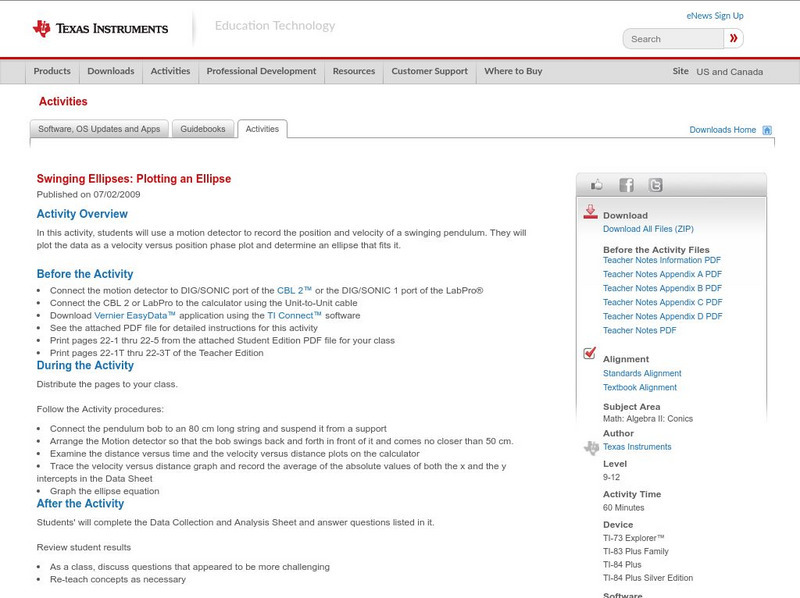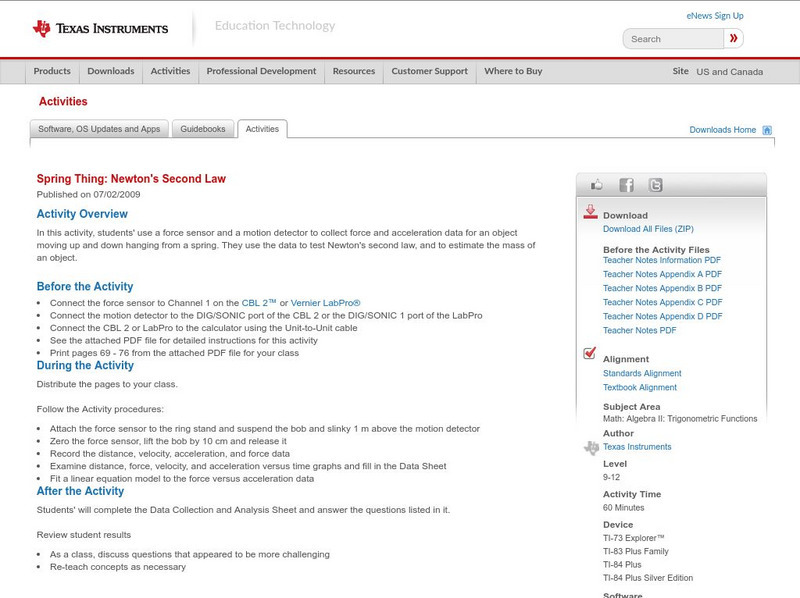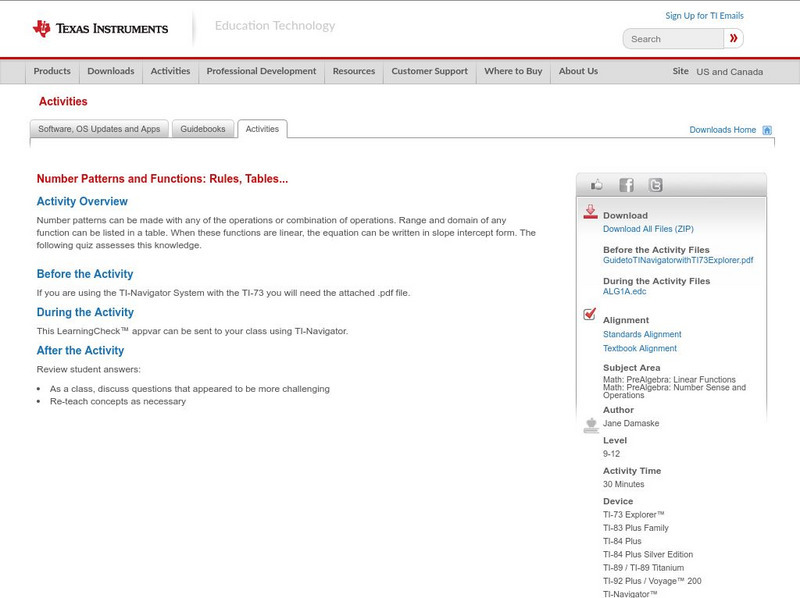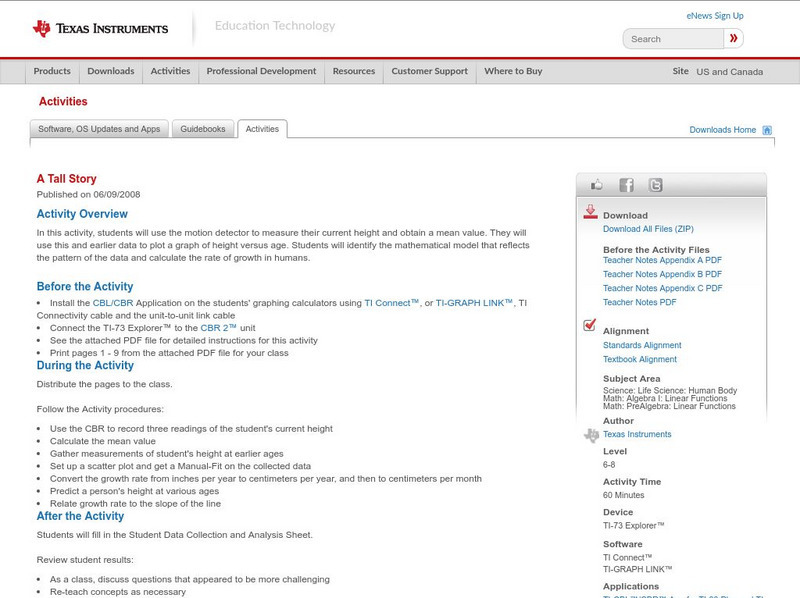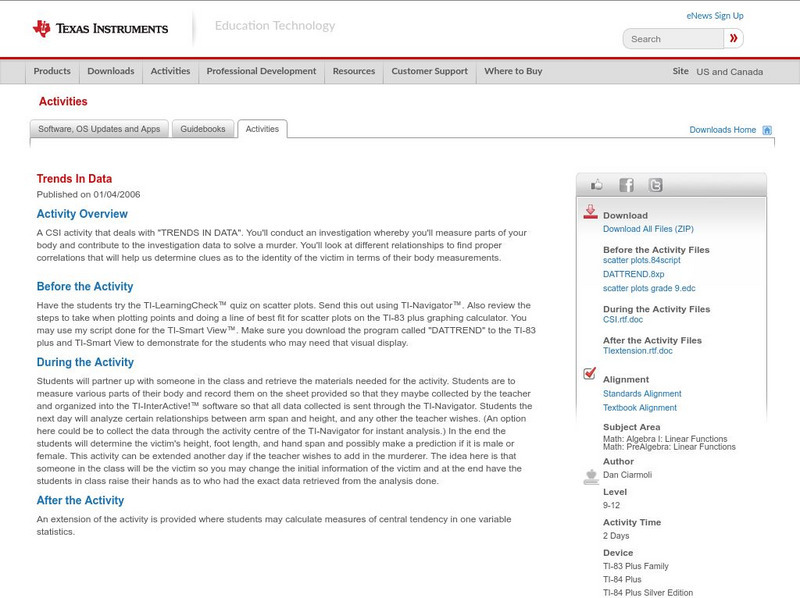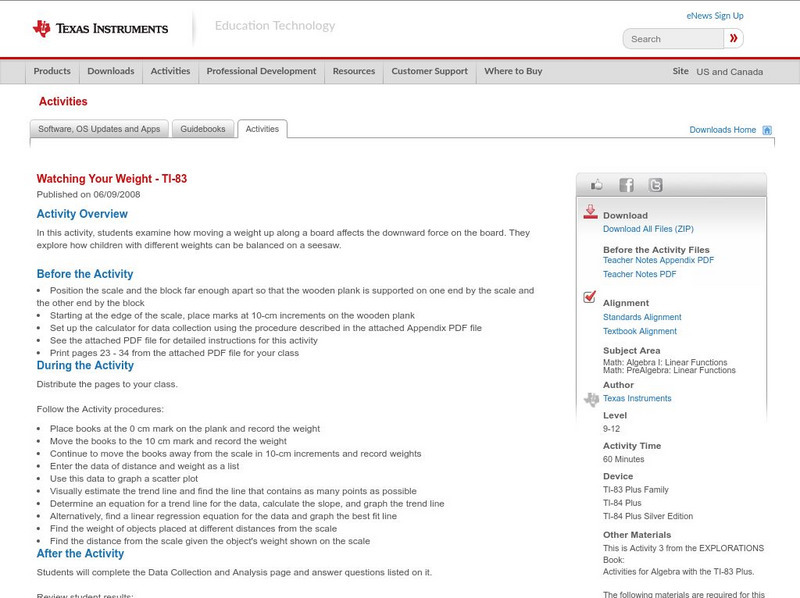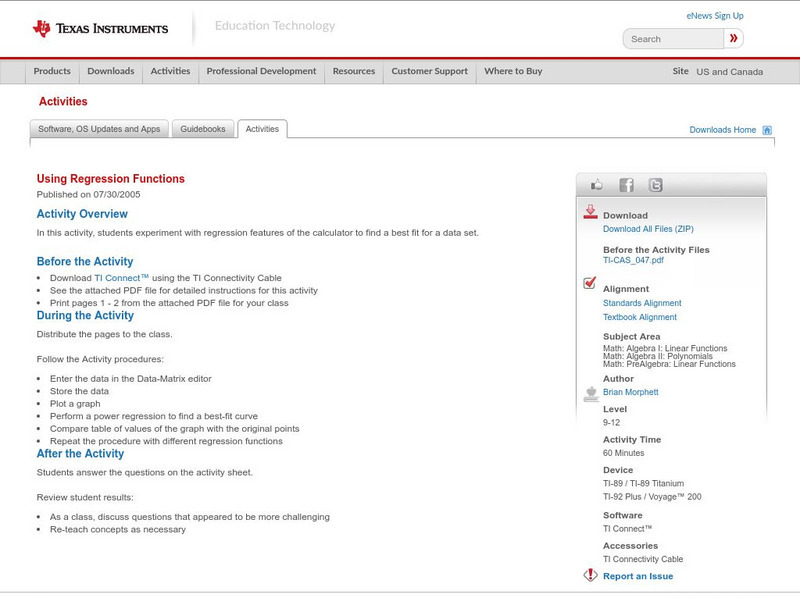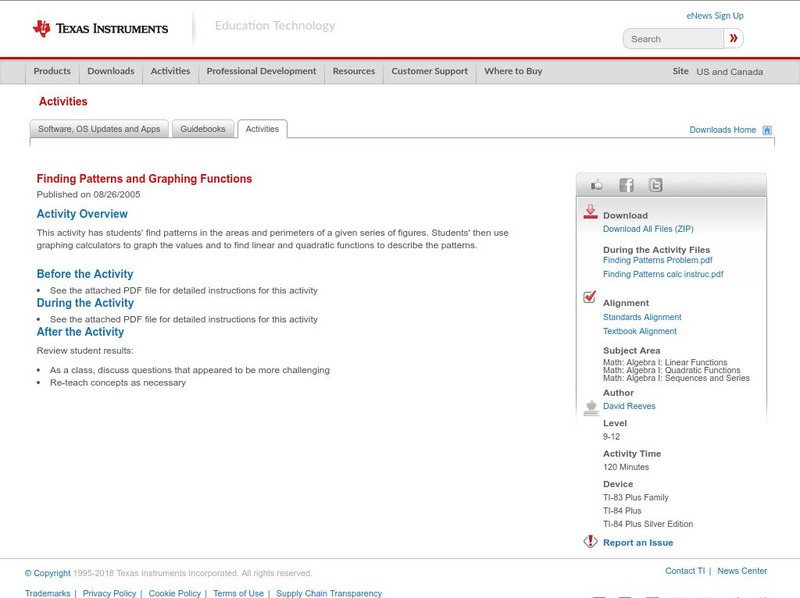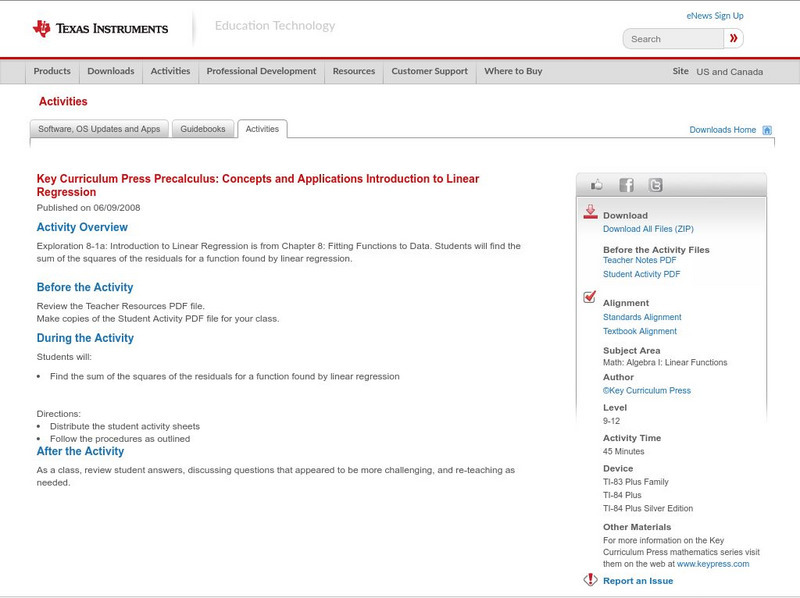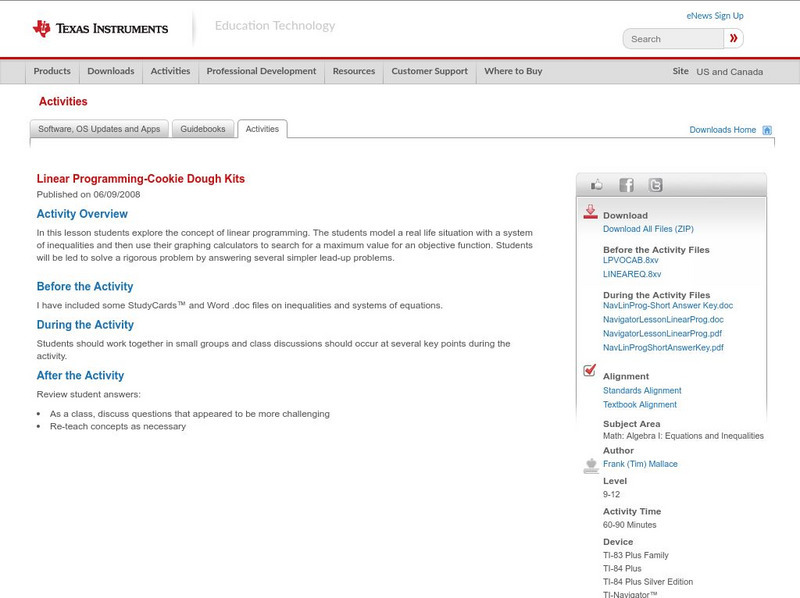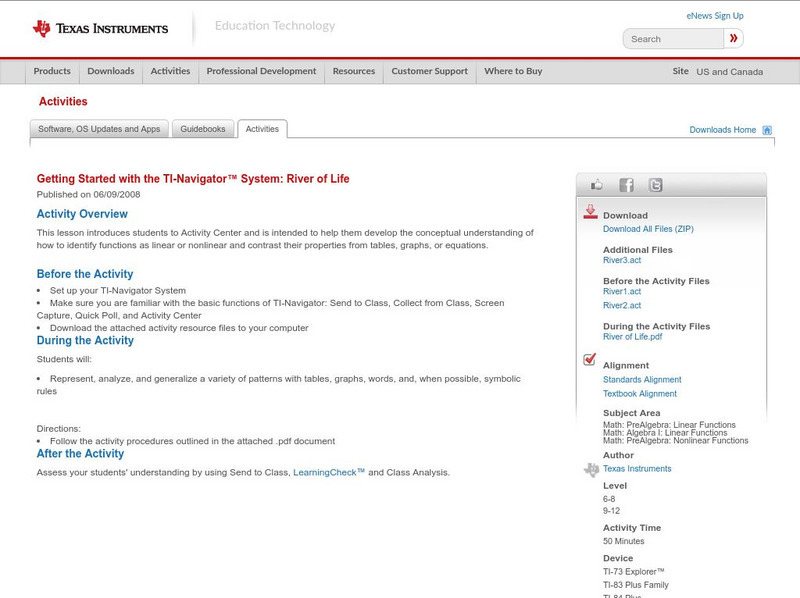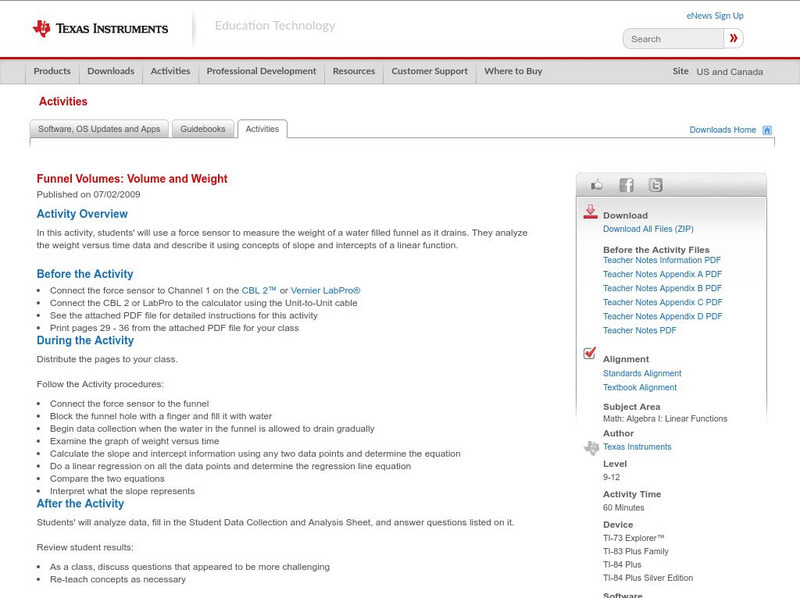Texas Instruments
Texas Instruments: Composing Music Mathematically
This activity is designed to motivate and challenge first year algebra students through a fun introduction to advanced mathematical concepts. It also offers extensions for upper grade level students. Students will recognize relationships...
Texas Instruments
Texas Instruments: Chill Out: How Hot Objects Cool
Students use a temperature probe to collect data as the warmed probe cools. Students investigate Newton's law of cooling and model cooling data with an exponential function. They fit the data to a mathematical model after analysis.
Texas Instruments
Texas Instruments: Swinging Ellipses: Plotting an Ellipse
In this activity, Students can use a motion detector to record the position and velocity of a swinging pendulum. They will plot the data as a velocity versus position phase plot and determine an ellipse that fits it.
Texas Instruments
Texas Instruments: Spring Thing: Newton's Second Law
In this activity, students' use a force sensor and a motion detector to collect force and acceleration data for an object moving up and down hanging from a spring. They use the data to test Newton's second law, and to estimate the mass...
Texas Instruments
Texas Instruments: Stretching a Penny
In this activity, students investigate how a spring stretches when different weights pull on it. They relate the stretch of the spring directly to the weight and vice-versa.
Texas Instruments
Texas Instruments: Number Patterns and Functions: Rules, Tables
Number patterns can be made with any of the operations or combination of operations. Range and domain of any function can be listed in a table. When these functions are linear, the equation can be written in slope intercept form.
Texas Instruments
Texas Instruments: A Tall Story
In this activity, students can use the motion detector to measure their current height and obtain a mean value. They will use this and earlier data to plot a graph of height versus age. Students will identify the mathematical model that...
Texas Instruments
Texas Instruments: Trends in Data
A CSI activity that deals with "TRENDS IN DATA". You'll conduct an investigation whereby you'll measure parts of your body and contribute to the investigation data to solve a murder. You'll look at different relationships to find proper...
Texas Instruments
Texas Instruments: Windows
This is a partner activity. One calculator is used to explore and the other is used to continue the learn check. It was designed to help students understand the concept of windows and what happens with the various window settings. Using...
Texas Instruments
Texas Instruments: Watching Your Weight Ti 83
In this activity, students examine how moving a weight up along a board affects the downward force on the board. They explore how children with different weights can be balanced on a seesaw.
Texas Instruments
Texas Instruments: Titration Curves: An Application of the Logistic Function
In this activity, Students can use a pH sensor to record pH versus base volume data for an acid base titration. They will manually model the curve using a logistic function.
Texas Instruments
Texas Instruments: Mc Dougal Littell Prealgebra: Graphing Quadratic Functions
Students will compare the graph of Y=x^2 with the graph of the given functions
Texas Instruments
Texas Instruments: Using Regression Functions
In this activity, students experiment with regression features of the calculator to find a best fit for a data set.
Shodor Education Foundation
Shodor Interactivate: Linear Inequalities
Students create linear inequalities and systems of linear inequalities on a coordinate plane. This is like a graphing calculator with advanced viewing options.
Texas Instruments
Texas Instruments: Finding Patterns and Graphing Functions
This activity has students find patterns in the areas and perimeters of a given series of figures. Students' then use graphing calculators to graph the values and to find linear and quadratic functions to describe the patterns.
Texas Instruments
Texas Instruments: Key Curriculum Press Precalculus: Intro to Linear Regression
Students will find the sum of the squares of the residuals for a function found by linear regression.
Texas Instruments
Texas Instruments: Linear Programming Cookie Dough Kits
In this lesson students explore the concept of linear programming. The students model a real life situation with a system of inequalities and then use their graphing calculators to search for a maximum value for an objective function....
Texas Instruments
Texas Instruments: Getting Started With the Ti Navigator System: River of Life
This lesson introduces students to Activity Center and is intended to help students develop the conceptual understanding of how to identify functions as linear or nonlinear and contrast their properties from tables, graphs, or equations.
Shodor Education Foundation
Shodor Interactivate: Number Cruncher
The Number Cruncher, provided by Shodor Education Foundation, is an activity on linear functions. "This activity allows the user to enter numbers and then attempt to find the rule the activity is using to get the data in the output box."
Texas Instruments
Texas Instruments: Exploring Slope Intercept Form of a Line
Use TI-Navigator to explore the relationship between a linear function and its graphs. See how the value of the slope and y-intercept affect the graphs.
Texas Instruments
Texas Instruments: Polynomial Multiplication
This StudyCard set shows that the product of linear functions (polynomial) is usually quadratic. Students discover the exact product and more traditional methods for multiplying polynomials.
Texas Instruments
Texas Instruments: Finding Slope Learn Check
Using the Activity Center, students will explore the characteristics of linear functions in the form y=mx+b. The major focus will be identifying slope and y-intercept.
Texas Instruments
Texas Instruments: Funnel Volumes: Volume and Weight
In this activity, students' will use a force sensor to measure the weight of a water filled funnel as it drains. They analyze the weight versus time data and describe it using concepts of slope and intercepts of a linear function.
Texas Instruments
Texas Instruments: Math Today for Ti Navigator System Humidity Makes Air Feel
Using data from the USA TODAY graphic "Humidity makes air feel hotter" students will explore linear functions to determine how well they model the relationship between air temperature and heat index. When the model has been determined...




